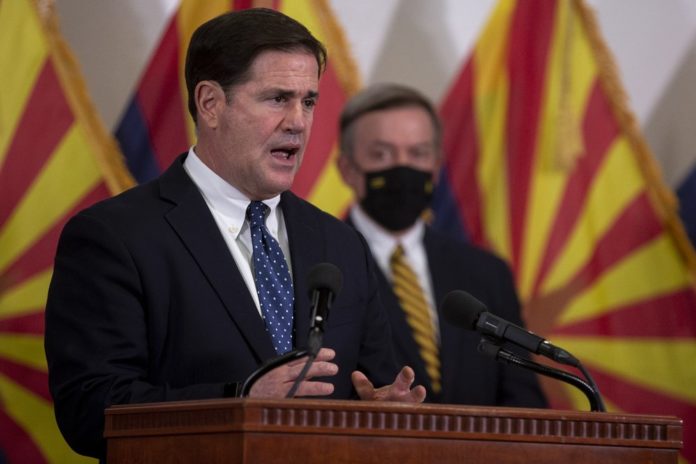
Arizona will provide the state’s three public universities with $14 million in additional funding to boost their efforts to test, track and respond to the coronavirus, Gov. Doug Ducey announced Thursday.
The money will help the universities, which combined have more than 190,000 students, build on their current efforts to track and contain the virus, both on campus and across the state. The schools receiving the funding are Northern Arizona University in Flagstaff, Arizona State University in Tempe and the University of Arizona in Tucson.
The governor said $6 million of new cash will be used by ASU to develop a rapid new “point of need” test for the virus.
“With point of need testing Arizona’s first responders, health care workers, people in congregate care settings and others will be able to be tested and get their results not in days or hours but minutes,” Ducey said. “These investments are critical for helping our communities stay safe and healthy.”
ASU President Michael Crow said it would likely take six months to develop a prototype of the test. It would use a small handheld device equipped with microchips and chemistry sets to test saliva from potentially infected people.
“That then communicates with your cell phone, you get the green light, you go to school, you go to work, you go to the game,” Crow said.
Crow noted that although the test would go first to front-line workers, the virus is likely to be a staple long into the future, and the goal is to eventually make the rapid test universally available.
“This is a permanent introduction of a new virus to the human ecosystem and we’re going to be dealing with it for a long time,” he said.
The money will also help expand wastewater testing, which the University of Arizona used last month to identify a small outbreak in a dormitory and quickly test and isolate two infected students before the outbreak spread.
Besides Crow, Ducey was joined at his weekly virus news briefing by UofA President Dr. Robert Robbins and NAU President Rita Cheng.
The new funding was announced as Arizona hospitals continue to get a break from the influx of coronavirus cases that nearly overwhelmed their ability to care for patients early in the summer, but new case counts are again edging up.
Virus counts released Thursday by the state Department of Health Services show 566 new confirmed cases across the state, bringing the total since the pandemic hit early this year to 215,852. The state announced 34 new deaths, bringing that total to 5,559.
The seven-day rolling average of daily new cases in Arizona has risen over the past two weeks from 525 new confirmed cases per day on Sept. 9 to 768 new confirmed cases per day on Sept. 23, according to data collected by The COVID Tracking Project. That upward tick may in part be due to the state health department now including “probable” results from less-accurate antigen testing.
But several counties could move from “moderate” to “substantial” spread categories as early as next week, state Health Services Director Dr. Cara Christ said. She said there are no plans to force some businesses to close again if they do, despite guidelines requiring it, and Ducey made that abundantly clear.
“Arizona’s economy is open, Arizona’s educational institutions are open, Arizona’s tourism institution is open. The expectation is they are going to remain open,” Ducey said. “We are not going to be, due to a gradual rise in cases, be making any dramatic changes.”
The number of infections is thought to be far higher because many people have not been tested, and studies suggest people can be infected with the virus without feeling sick.
Hospital use is way down from the mid-July peak that saw more than 3,500 people being treated. The state reported just 565 people hospitalized for the virus as of Wednesday, with just 122 in intensive care and only 64 needing ventilators to help them breathe.
For most people, the new coronavirus causes mild or moderate symptoms, such as fever and cough that clear up in two to three weeks. But for some, especially older adults and people with existing health problems, it can cause more severe illness, including pneumonia and death.
Republished with the permission of the Associated Press.














